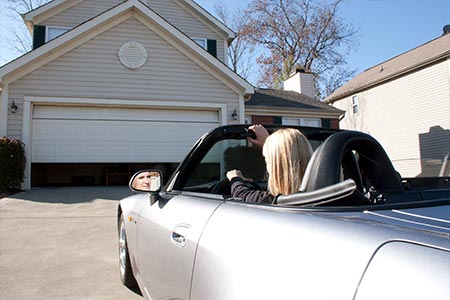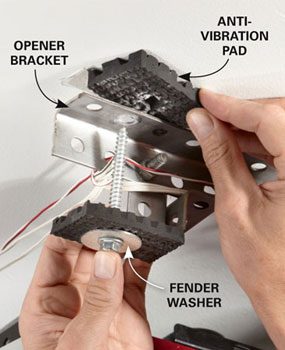Table of ContentsHow To Quieten A Noisy Garage DoorHow To Fix A Noisy Garage Door With Garage Door LubeNoisy Garage Doors: Diagnosing SoundsHow Can A Noisy Garage Door Be Fixed?
Often times, the sound you're speaking with your garage door is straight associated with the opener. If your garage door opener all of a sudden appears louder than normal, it could be a sign that it's using out and coming to the end of its time. However, prior to you make the decision to get a brand-new garage door opener, there are a couple of things you can inspect that'll restore your present opener.
This is a common upkeep task associated with chain driven openers. Another cause of a loud garage door stemming from the opener is that the inner-workings are worn. Take a look at your opener's manual and make changes from there. If you're uncomfortable doing so, contact your local repair service.
As this is the most drastic procedure to take for a loud garage door, you need to check everything to ensure you didn't miss out on the cause of the sound. Frequently, an old and used out garage door will be loud no matter what. For example, a dinged up aluminum one or a decomposing wood garage door are both lost causes.
Unlike wood and aluminum, a steel garage door will stand the test of time and won't rot, swell, warp or damage. They're produced the Midwest. Just the garage door isn't enough though. You need to combine that door with a quality opener and excellent setup. If your garage door is not properly set up, it'll begin making noise in no time.
We've been serving the Midwest for over 40 years and have all the skills and experience necessary to finish the job right. Our installers are factory experienced and licensed in order to ensure that your garage door gets set up correctly and https://www.johnsgaragedoorrepair.com/blog/ efficiently. So, if you can't discover the source of your loud garage door and have actually tired all other options, get a totally free quote now for a new garage door from Feldco that'll stay quiet and keep you and the next-door neighbors pleased.
What To Do If My Garage Door Opener Starts Making Strange
 How To Tell If You Should Repair Or Replace A Garage Door
How To Tell If You Should Repair Or Replace A Garage Door
It can be bothersome to have a garage door that rattles, squeaks, and screams as it opens and closes. Some homeowners claim they can hear and feel their garage door opening in every space in the house. It can be a good warning signal, but ultimately it's the extra sound that you could do without.
Garage doors develop vibrations during opening and closing. This results in loud and distracting sounds. It may not be an issue throughout the day, however if you are attempting to sleep, it can be disruptive. Lower the vibrations, and you will reduce the noise level. You don't require to change your garage door or door opener with a quieter design, just do a little maintenance.
Ensure whatever is tight. Be mindful not to over-tighten. Garage doors have moving parts that need to be maintained. Spray the top of the springs with lubricants, using enough oil or lubricant to stream down to the base of the springs. Spray the within each track and around all the metal rollers.
Enjoy and figure out if the chain is sliding quickly around the gears. Spray the hinges between all the panels. Any moving part can trigger vibrations. Keep garage noise to a minimum by lubricating moving parts at least twice a year. Be liberal when utilizing spray lubricants. Examine the rollers on your garage door.

Nylon rollers are much quieter, do not need lubricants, and need less maintenance than metal rollers. Nylon garage rollers aren't much more costly, and the sound reduction is worth the money. Standard five-section garage doors require a lots rollers. If you are replacing your rollers, do them all at when.
What To Do About A Noisy Garage Door Opener
Pieces of rubber utilized as buffers for the garage door and the door openers will help you minimize noise. Before working on your door and opener, disconnect the motor of the door opener. Location a strong ladder under the door and rest the door on the ladder. Remove the door opener motor from its mounting bracket and location it carefully on the floor or your workbench.
Move a piece of rubber about 1/4 inch broad in between the door and the bolts. Tighten the bolts. Next, get rid of the bolts holding the door to the assistance frame. Utilizing thick rubber, cut two rectangle-shaped pieces, drill 2 holes, and bolt one end to the frame of the garage door opener.
Suspend the opener from the frame by the rubber pieces. The rubber will soak up loud vibrations before they cause the metal assistance frame to shudder. Evaluate the garage door and opener to make certain that they still work properly. You might need to readjust your garage door locks after dealing with the bolts and gaskets.
 7 Signs You Need A New Garage Door
7 Signs You Need A New Garage Door
See for the lock bar hitting the track, making noise and not catching. When your door moves up and down, misalignments can cause grinding noises. Find the L-shaped leader brackets attached to the door. Undo the screws and tap the guide up or down; depending upon how the positioning is off, tighten the bolts and screws and repeat on the other guide.
With a missing out on insulation strip, you will feel cold and damp entering into your garage and hear a loud banging sound when the door is closed. You can quickly change this strip by removing the old one and acquiring a roll of rubber insulation from your regional lumber or garage door store.
Garage Door Lubricant For Your Noise Problems
Slide-out the old and used strip and move the brand-new rubber through the tracks in the door. Enjoy as you godon't get ahead of yourself and cut the insulating strip too short. If the strip is too long, that's alright; you can adjust it later. Rubber insulation will shrink, so do not cut it to fit your door width precisely.